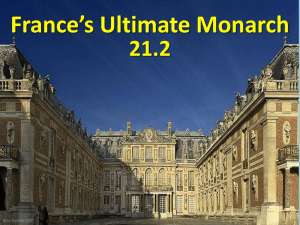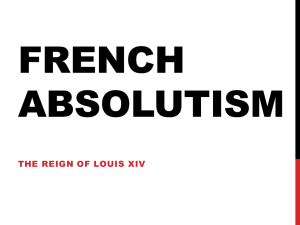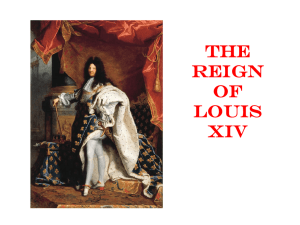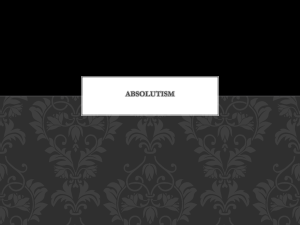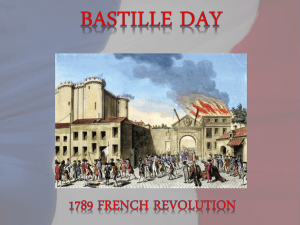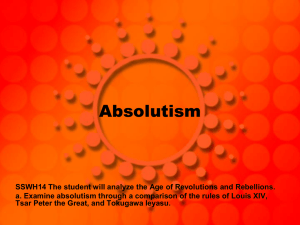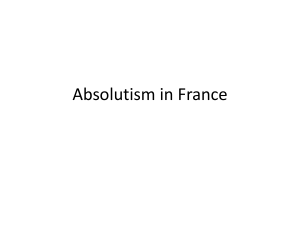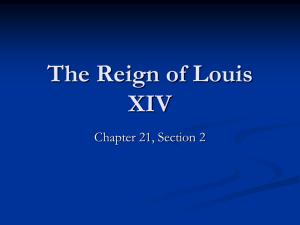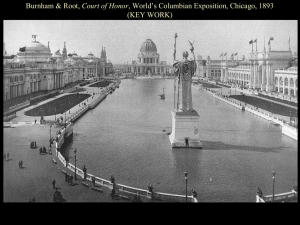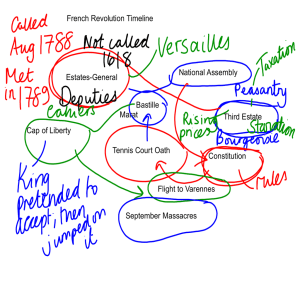The Reign of Louis XIV - Madison County Schools
advertisement
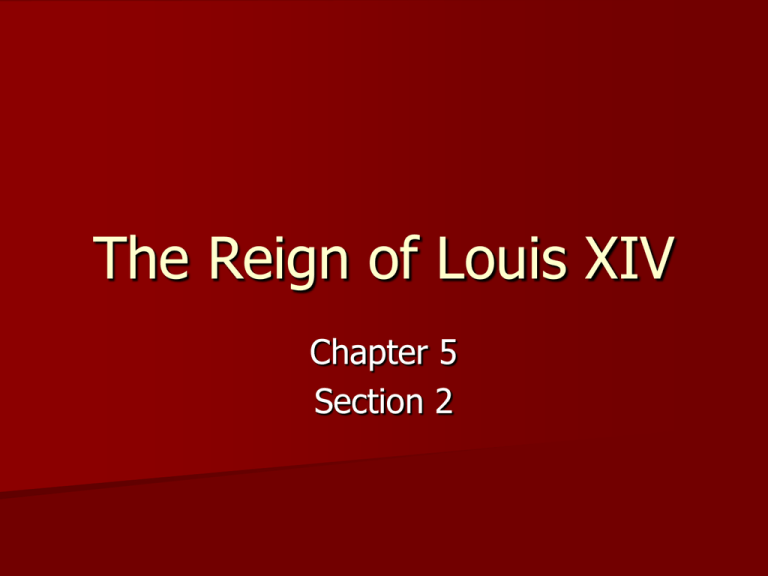
The Reign of Louis XIV Chapter 5 Section 2 Main Ideas After a century of war and riots, France was ruled by Louis XIV, the most powerful monarch of his time. Louis’ abuse of power led to revolution that would inspire the call for democratic government throughout the world. Introduction 1559, Henry of France died. – Left four young sons. Three of the sons ruled but were all incompetent. Their mother, Catherine de Medici was the real power. Catherine tried to preserve royal authority but religious wars between the Catholics and Huguenots made it difficult. Religious Wars and Power Struggles Catholics and Huguenots fought 8 religious wars between 1562-1598. 1572 – St. Bartholomew’s Day Massacre in Paris. – Sparked a six week nationwide slaughter of the Huguenots. – Huguenot nobles were attending a wedding for Catherine’s daughter and Henry of Navarre. Henry of Navarre Catherine and her last son died in 1589. – Henry inherited the throne. – Became Henry IV, the first king of the Bourbon dynasty in France. Catholics opposed Henry. Henry gave up Protestantism and converted for the sake of his country. Edict of Nantes 1568 – Henry declared – – that the Huguenots could live in peace in France – and set up their own houses of worship in some cities. This is an example of religious toleration. Known as the Edict of Nantes Rebuilding France Henry devoted his reign to rebuilding France. He restored the monarchy in France to a strong position. Some people were happy and welcomed peace. Others disliked Henry for his religious compromise. 1610 – Henry was stabbed to death while riding in his carriage. Louis XIII & Cardinal Richelieu Louis XIII = Henry’s son – Took over after Henry’s death – Very weak king 1624 – appointed Cardinal Richelieu, a Catholic minister, to assist him. Cardinal Richelieu In a sense – the ruler of France. Wanted to increase the power of the Bourbon monarchy. Went about this by two steps… Richelieu’s Steps 1. Moved against Huguenots. – Still allowed them to practice, but would not let them build walls around their cities. 2. Sought to weaken nobles’ power. – Increased the power of government officials that were middle class. Richelieu also got France involved in the Thirty Years’ War against the Hapsburgs. Skepticism The idea that nothing can ever be known for certain. French thinkers expressed an attitude of doubt toward churches that claimed to have the only correct set of doctrines. Montaigne & Descartes Read the three paragraphs under Montaigne and Descartes on page 163 in your text. Answer the following questions: How might political and religious leaders have reacted to the work of Montaigne? Did Descartes’ response to the challenges of skeptics such as Montaigne put an end to the skeptics’ arguments? Explain. Louis XIV Comes to Power The efforts of Henry IV and Richelieu strengthened the French monarchy and paved the way for Louis XIV. Louis XIV became the most powerful ruler in French history. – “I am the state.” – Was four when he began his reign. Louis, the Boy King Louis XIII died in 1643, leaving his son to reign. Richelieu’s successor, Cardinal Mazarin really ruled France. Mazarin ended the Thirty Years’ War. Mazarin Many people hated Mazarin, particularly the nobles. Strengthened the central government. Nobles led riots and threatened the king’s life. Louis would never forget the fear. Wanted to be so strong that he could never be threatened by them again. Louis Weakens the Nobles’ Authority Mazarin died in 1661, leaving 22 year old Louis to rule alone. Excluded nobles from councils to weaken their power. Increased power of intendants (officials who collected taxes & administered justice). Demanded regular communication between local officials and him. Economic Growth Louis devoted himself to making sure that France attained economic, political and cultural brilliance. Minister of Finance, Jean Baptiste Colbert, assisted him greatly in achieving these goals. – Tried to make France selfsufficient. – Manufacture everything & not rely on imports. Jean Baptiste Colbert Gave government funds & tax breaks to French companies. Placed a high tariff on imports. Encouraged people to migrate to Canada. After Colbert died, Louis recalled the Edict of Nantes. Response? Huguenots fled the country. Result? France lost many skilled workers. The Sun King’s Grand Style Spent a fortune to surround himself with luxuries. Each meal was a feast. Built a fabulous palace known as Versailles. Page 166. Louis Controls the Nobility Required hundreds of nobles to live with him. At least 100 of the most privileged nobles waited outside Louis’ canopy bed to help him dress. – Four would have the honor of handing him his slippers or holding his sleeves. Patronage of the Arts Versailles was a center of the arts during Louis’ reign. Louis made opera & ballet more popular. Louis Fights Disastrous Wars Under Louis, France was the most powerful country in Europe. 1660, France’s population was about 20 million. – 4 times that of England – 10 times that of the Netherlands French army was ahead in terms of size, training and weaponry. Attempts to Expand France’s Boundaries 1667, Louis invades the Spanish Netherlands. – Gains 12 towns Tries the same with the Dutch – They flood the city and stop France. Louis continued to try to fight wars. Problem? The rest of Europe had formed an alliance and wanted to stop France. William of Orange 1689 - Dutch prince, William of Orange, became the king of England. Joined the League of Augsburg – Hapsburg emperor, Kings of Sweden, and Spain Defeated France France’s Problems & Louis’ Mistakes Problems Series of poor harvests Constant warfare New taxes (to pay for the war) Mistakes Massive Population Expanding France Continuous expansion War of the Spanish Succession French longed for peace. – Instead, got another war. 1700 – Charles II (King of Spain) dies and leaves throne to Philip of Anjou (Louis XIV’s grandson). Enemies were now both ruled by French Bourbons. England, Dutch Republic, Portugal, and several German and Italian states joined together against France and Spain Treaty of Utrecht War dragged on until 1714. Under the Treaty of Utrecht, Louis’ grandson could remain king as long as France & Spain did not unite. Big Winner? Great Britain Great Britain gets Gibraltar, permission to sell slaves in Spanish Colonies, and gave Britain Nova Scotia, Newfoundland, and Hudson Bay area Louis’ Death and Legacy Last years – More sad than glorious Regretted the suffering he brought to France due to his wars. Died in 1715 – led to great rejoicing. Positive side – France was a great power Negative side – war and Versailles left France in great debt
